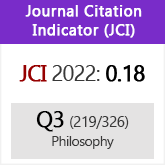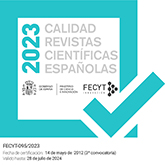Platonic Dialectics: A Remedy for the Polis?
DOI:
https://doi.org/10.3989/isegoria.2020.062.06Keywords:
Plato, Dialectics, Refutation, Polis, Law, RepublicAbstract
In this article we examine one of the viewpoints linked to Platonic dialectics which directly concerns the conformity of the polis: the underlying questioning which the modus operandi of dialectics applies to everyday life, to social conventions, formalities, and generally accepted beliefs. We focus here on the passage in the Republic 537e-539e where dialectics is intimately linked to refutation. This procedure, which leads to the development of the dialectic method, requires distancing from the everyday and unconsciously assumed viewpoint, exercising critical consciousness. Plato explores the dangers of dialectics at the border between questioning the norm and assuming responsibility towards the polis.
Downloads
References
Fuentes
Platón. Platonis Opera, I-V, ed. J. Burnet, Oxford: Clarendon Press, 1961.
Platón. República (trad. de Conrado Eggers, L.). Madrid: Gredos, 1988.
Platón. República (trad. de Pabón, J. M. y Fernández-Galiano, M.). Madrid: Centro de estudios políticos y constitucionales, 1997.
Platón. Apología, Lisis (trad. Lledó, E., García Gual, C. y Calonge, J.). Madrid: Gredos, 1985.
Platón. Gorgias (trad. Calonge, J., Méndez, E. Olivieri, F. J. y Calvo, J. L.) Madrid: Gredos, 1983.
Platón. Fedón, Banquete, Fedro (introd., trad. y notas de C. Carcía Gual, M. Martínez y E. Lledó). Madrid: Gredos, 1986.
Platón. Teeteto (trad. Santa Cruz, M. I., Vallejo, A. y Cordero, N.). Madrid: Gredos, 1988.
Estudios
Aparicio, C. El ejemplo de los oficios en los diálogos de Platón: Una vía de acceso a su filosofía. 2014 (http://www.tesisenred.net/bitstream/handle/10803/283187/tcap1de1.pdf?sequence=1).
Aronadio, F. Procedure e veritá in Platone. Bibliopolis: Napoli, 2002.
Calvo Martínez, T. "La crítica de Platón a la Poesía y al Arte" en De animales y hombres: Studia Philosophica, Herrera, A. (ed.) Biblioteca Nueva: Oviedo, 2007, pp. 223-238.
Courcelle, P. "Connais-toi toi-même", de Socrate à saint Bernard. Études Augustiniennes: París, 1975.
Dixaut, M. "What is it Plato calls thinking?" en Boston Area Colloquium for Ancient Philosophy XIII, 1999, pp. 1-27.
Hadot, P. Qu'est-ce que la philosophie Antique? Gallimard: París, 1995.
Heidegger, M. Was ist Metaphysik? Lección inaugural pronunciada en la Universidad de Friburgo en 1929. (Trad. Zubiri, X. Siglo Veinte: Madrid, 1947).
Huizinga, J. Homo ludens. Alianza Editorial: Madrid, 1972.
Jacques, F. "Dialogue et dialectique chez Platon: une réévaluation" en La naissance de la raison en Grèce. Presses Universitaires de France: Paris, 1990, pp. 391-403.
Jaeger, W. Paideia: los ideales de la cultura griega. (Trad. castellana Xirau, J. y Roces, W.) Fondo de Cultura Económica: Madrid, 1993, 12ª edición.
Ortega y Gasset, J. Ideas y creencias. Alianza: Madrid, 1986.
Perelman, Ch. "La méthode dialectique et le rôle de l'interlocuteur dans le dialogue" en Revue de Métaphysique et de Morale, Nº 1/2, 1965, pp. 26-31.
Solana, J. "Retórica y dialéctica: disputa sobre la unidad del Fedro", en L'Antiquité Classique, T. 63, 1994, pp. 231-236. https://doi.org/10.3406/antiq.1994.1195
Trabattoni, F. "L'intuizione intellettuale in Platone. In margine ad alcune recenti pubblicazioni", en Rivista di storia della filosofía, 3/2006, pp. 701-719.
Wachterhauser, R. Beyong Being. Gadamer's Post-Platonic Hermeneutical Ontology, Northwestern University Press: Evanston, 1999.
Wieland, W. "La crítica de Platón a la escritura y los límites de la comunicabilidad", en Methexis, Vol. 4, 1991, p. 30-31. https://doi.org/10.1163/24680974-90000082
Downloads
Published
How to Cite
Issue
Section
License
Copyright (c) 2020 Consejo Superior de Investigaciones Científicas (CSIC)

This work is licensed under a Creative Commons Attribution 4.0 International License.
© CSIC. Manuscripts published in both the printed and online versions of this Journal are the property of Consejo Superior de Investigaciones Científicas, and quoting this source is a requirement for any partial or full reproduction.All contents of this electronic edition, except where otherwise noted, are distributed under a “Creative Commons Attribution 4.0 International” (CC BY 4.0) License. You may read here the basic information and the legal text of the license. The indication of the CC BY 4.0 License must be expressly stated in this way when necessary.
Self-archiving in repositories, personal webpages or similar, of any version other than the published by the Editor, is not allowed.














